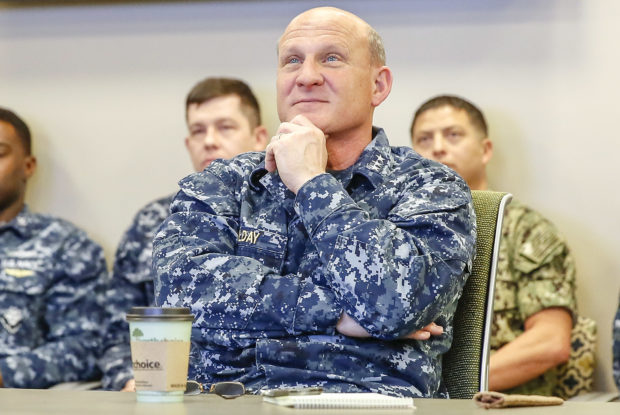Navy: There Isn’t any Reason for the Trump Transgender Ban, but We’ll Try to Make It Look More Fair Than It Is
Vice Admiral Michael Gilday, just confirmed to be the new Chief of Naval Operations, was extremely clear in his testimony (at page 56) to the Senate about whether transgender military service and, more specifically, service by people who transition gender before or during service, has had any impact on readiness:
Q: In your experience, has the service of transgender individuals in their preferred gender had any negative impacts on unit or overall readiness in the Navy?
A: I am unaware of negative impacts on unit or overall Navy readiness as a result of transgender individuals serving in their preferred gender.
Admiral Gilday’s answer echoed similar sentiment from all military chiefs of staff and was 180 degrees opposed to the reasoning that former Defense Secretary James Mattis offered to shore up the ban. Mattis concluded that “accommodating gender transition could impair unit readiness; undermine unit cohesion, as well as good order and discipline.” (Note the focus on what “could” happen. An earlier Palm blog post exposed this use of hypothetical, evidence-free justifications for the transgender ban.)
In contrast, Admiral Gilday reported on what actually did happen when transgender personnel could serve openly, not on what could or might happen. And his answer was that nothing happened, not to individual units and not to the Navy overall—it was a non-event.
But another of his answers to the Senate strangely downplayed the effect of the reinstated ban by making it seem far more fair and accommodating than it actually is. Misleading characterizations of how the ban actually works have become more common after publication of specific policy under DTM-19-004, as if to create the impression that things are not so bad. (“Nothing to see here, folks.”)
Admiral Gilday first explained DOD’s universal deployment standards under DOD Instruction 1332.45. This regulation requires that any service member who is not deployable for a period of 12 consecutive months, with a few exceptions, be evaluated for separation from service. Gilday was then asked (at page 54) whether the “deploy or get out” policy applies to transgender sailors, and he answered that the policy applies “equally” to everyone, including “those who identify as transgender.”
It’s not really a wrong answer. It’s more of an incomplete answer, or a misleading answer. Transgender policy is fundamentally different from any other medical-personnel policy because it is the only policy that can make someone ineligible for continued service even if proper medical care would keep them fit and deployable. DTM-19-004 requires separation for anyone with a medical need to transition gender, even if that process would not require a single day of non-deployability, let alone the year permitted by “deploy or get out.”
The transgender ban categorically prohibits a certain kind of established medical care (gender-transition treatment) and then lets the chips fall. If a member can still do the job and meet deployability standards while serving in birth gender and without medical support, then that’s fine under the policy. If not, then the member will be separated. And so when the Chief of Naval Operations nominee says that the 12-month policy applies to everyone, that is technically correct. But the transgender member carries separate burdens that don’t affect other members. Once gender-transition care is a medical necessity, the other rules (like the 12-month rule) don’t matter anymore, because transgender personnel are immediately subject to separation. They don’t get the 12 months; they don’t even get one day. It doesn’t matter whether they can meet all the usual deployability standards.
To say that transgender personnel are treated “equally” under “deploy or get out” is extremely misleading, because they are denied the opportunity to show they can meet the standard as soon as a military doctor advises gender-transition treatment. But Admiral Gilday does promise that transgender sailors will be treated with “dignity and respect.” It’s hard not to hear that phrase as the equivalent of the “thoughts and prayers” offered after a shooting. A nice sentiment, but it won’t include any action to prevent future harm.
